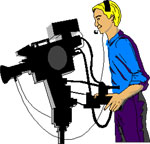|
|
|
|
|
Volume 24, Issue 143, Jim Carnegie, Editor & Publisher
|
Tuesday Morning July 24th, 2007
|
|
|
Radio News ®
|
 Cumulus Media agrees to buyout Cumulus Media agrees to buyout
Shareholders stand to get a 40.4% premium over Friday's closing price in the 1.3 billion bucks buyout announced before the market opened yesterday, with Cumulus Media CEO Lew Dickey, his family and Merrill Lynch Global Private Equity teaming up to take the radio company private. With that hefty premium, it seems unlikely that other bidders will emerge. Nevertheless, the directors of Cumulus and their independent advisors have 45 days to shop the company for a higher bid. The Dickey family and the early shareholders associated with Banc of America Capital Investors are pledged to vote their shares, approximately 13.6% of the total outstanding, in favor of the Merrill Lynch/Dickey bid or any superior bid which surfaces. At least one Wall Street analyst likes the price from a seller's point of view, but wonders how the buyers can make the deal work. "The news is surprising to us given the company's fundamentals - declining EBITDA expectations in a tough revenue environment and leverage of 8.2x compared with an industry average of 5.1x," said Anthony DiClemente in a note to Lehman Brothers clients after the deal was announced. The analyst noted that EBITDA has declined for five of the last six quarters at Cumulus - and he is expected declines for the remainder of this year. "Despite the fact that business fundamentals remain challenged for general market radio broadcasters, this bid, on the heels of the pending Clear Channel buyout, demonstrates that private equity funds continue to consider these companies as potential takeout candidates, making it difficult for us to value our covered radio stocks on intrinsic valuation alone," DiClemente wrote.
RBR observation: Lew and his brothers are radio guys through and through. Their father was a station owner and his sons all grew up in the business. They clearly believe in the business and have convinced their new private equity backers that there is money to be made in radio. The stakes will be high, since a company that already has pretty high leverage is being re-leveraged with a structure to boost returns for new private equity investors. Cumulus shareholders will be paid a total of 508 million for their stock, although that includes the Dickey family stake that will be rolled back into the deal, with the rest of the 1.3 billion price tag in debt assumption.
|
|
|
 Who else will go private? Who else will go private?
Calling this the "Year of the buyout," Bear Stearns analyst Victor Miller sees Radio One and Cox Radio as likely candidates to join Clear Channel and Cumulus Media in going-private buyouts of public shareholders, but he doesn't think Emmis is a candidate anymore. The view from Jonathan Jacoby at Bank of America is quite different. Among the companies he covers, he sees only Emmis as likely to go private, with Cox Radio unlikely to do so. "Radio stocks likely will rally over the next few days, as the speculation will be that others can follow," Jacoby told clients in a research alert. But he added, "this rally likely won't last." Even though he thinks CEO Jeff Smulyan may make another buyout attempt at Emmis, Jacoby also said there is no rush for Smulyan to make a move, especially when there is a run-up in the stock price. In Jacoby's view, Citadel is already highly leveraged and Cox Radio has a 60 million bucks option to purchase some stations in early 2008, so he doesn't think either is a buyout candidate. Entercom management might think about going that route, but he thinks they will instead focus on acquisitions. At Bear Stearns, Cumulus wasn't even on the previous list that Miller put out of potential buyout candidates, due to its high leverage. "In our April 2007 note, we cited Clear Channel, Cox Radio, Emmis, and Radio One as likely to pursue privatization in the next year. To date, Clear Channel and Cumulus have made go-private bids. We still believe that Radio One and Cox Radio are candidates for a take-out. We wonder if Entercom would consider a move, but think Emmis will not likely go private due to its precipitous decline in cashflow," Miller told clients after the Cumulus deal was announced.
Is monopoly best served whole or a la carte?
Satellite audio services XM and Sirius floated the notion of offering a la carte channel services to kick off a new week of media warfare over whether or not the proposed merger should be allowed to go through. In response, NAB said relevant government authorities "should not be hoodwinked" by the announcement. The DARS companies said they would offer channel options, one of which would allow a subscriber to select 50 channels for 6.99 per month, 46% less than the current 12.95 monthly fare. Another package will allow up to 100 channels to be selected, including cross-offerings (XM subscribers could pick Sirius channels and vice versa). A la carte prices would max out at 16.99 per month, with eight different a la carte options being made available. NAB of EVP Dennis Wharton responded, "Policymakers should not be hoodwinked by today's announcement, since nothing is stopping either XM or Sirius from individually offering consumers a more affordable choice in limited program packages. Moreover, after reading the fine print, one discovers that XM and Sirius customers have to buy a new radio for an undisclosed fee to reap the alleged rewards from today's announcement. The history of antitrust law demonstrates that two hotly-competitive companies will promise anything to become a monopoly. That, coupled with the brazen lack of candor displayed by both XM and Sirius in breaking FCC interference and terrestrial repeater rules, illustrates convincingly that this anti-consumer merger ought to be summarily rejected."
|
|
|
Bancrofts hold their family reunion
 The far-flung Bancroft family met yesterday to review the five billion bucks offer from News Corporation and, within a week, decide whether to back a sale of Dow Jones & Co., which the family has controlled for 100 years. With the family fortune split so many ways, it is hard to predict whether the family will unite on a single position. Christopher Bancroft - one of the few heirs who actually carries the name - is a Dow Jones director and has been seeking an alternative to selling to Rupert Murdoch and News Corporation. But some of his cousins are apparently of the opinion that Murdoch's offer is attractive and that no good alternative is likely to emerge. Meanwhile, Internet entrepreneur Brad Greenspan has sent Dow Jones shareholders his own proposal to keep the company independent and drive the stock price to 100 bucks, well above the 60 being offered by Rupert Murdoch and News Corporation. He noted the brand value of the Wall Street Journal in explaining his proposal. "Leveraging this leadership position and formula that has taken decades to build, Dow Jones is better positioned than any other company in the world to be the financial news leader bot online and on cable/satellite," Greenspan said in his letter. "Trumping CNBC would create five billion in incremental value for Dow Jones shareholders. A great target to shoot for, but even a much more conservative outcome provides significant incremental value for Dow Jones shareholders," he insisted. Greenspan's plan involves a "WSJ Video" site and having WSJ.com take on Yahoo! Finance head-to-head. His recapitalization plan would buy out half of the current shareholder base at 60 bucks per share, the same price as the Murdoch offer, and take on new debt to fund the digital initiatives, with two members of Greenspan's Journal Investment Group taking seats on the Dow Jones board of directors. The far-flung Bancroft family met yesterday to review the five billion bucks offer from News Corporation and, within a week, decide whether to back a sale of Dow Jones & Co., which the family has controlled for 100 years. With the family fortune split so many ways, it is hard to predict whether the family will unite on a single position. Christopher Bancroft - one of the few heirs who actually carries the name - is a Dow Jones director and has been seeking an alternative to selling to Rupert Murdoch and News Corporation. But some of his cousins are apparently of the opinion that Murdoch's offer is attractive and that no good alternative is likely to emerge. Meanwhile, Internet entrepreneur Brad Greenspan has sent Dow Jones shareholders his own proposal to keep the company independent and drive the stock price to 100 bucks, well above the 60 being offered by Rupert Murdoch and News Corporation. He noted the brand value of the Wall Street Journal in explaining his proposal. "Leveraging this leadership position and formula that has taken decades to build, Dow Jones is better positioned than any other company in the world to be the financial news leader bot online and on cable/satellite," Greenspan said in his letter. "Trumping CNBC would create five billion in incremental value for Dow Jones shareholders. A great target to shoot for, but even a much more conservative outcome provides significant incremental value for Dow Jones shareholders," he insisted. Greenspan's plan involves a "WSJ Video" site and having WSJ.com take on Yahoo! Finance head-to-head. His recapitalization plan would buy out half of the current shareholder base at 60 bucks per share, the same price as the Murdoch offer, and take on new debt to fund the digital initiatives, with two members of Greenspan's Journal Investment Group taking seats on the Dow Jones board of directors.
RBR observation: It would be premature to call the Greenspan plan half-baked. It doesn't look like he has even fired up the oven. Just saying we'll do a cable network and some online sites is easy. We doubt that he has any idea how difficult and expensive it would be to get cable carriage for a new freestanding financial network. Certainly his claim that a Dow Jones News Channel would have a lower initial operating loss than the soon-to-launch Fox Business Channel, which has the benefit of being joined at the hip to other cable channels, just shows his lack of experience in the cable arena. The WSJ already has an extremely successful website, so why do they need Greenspan to help them move into online video?
|
|
|
|
| Wall Street Media Business Report TM |
Ad slump for Journal Communications
Q2 revenues were down 4.3% at Journal Communications, blamed on weakness in classifieds for the newspaper business and soft auto advertising for broadcasting. TV was down 6.4% to 34 million against tough political comps. Radio revenues were down 0.5% to 22 million, but that is without accounting for the sale of two stations. On a same station basis, radio was up 1.6%. Publishing revenues were down 0.5% to 67.6 million. TV operating earnings were down 35.4%, radio 22.7% (19.8% same station) and publishing was up 40.3%, although that included a boost from the sale of a printing facility. Looking ahead, Journal Broadcast Group CEO Doug Kiel said Q3 pacings are similar to Q2 for both radio and TV, although he noted that political advertising "is the wild card."
|
|
|
|
|
Ad Business Report TM
|
 MediaBank gets MediaBank gets
10.5 million investment
Yet another online startup is hoping to establish itself as the standard for how all sort of old media and new media advertising is sold. MediaBank announced a 10.5 million bucks investment from New Enterprise Associates (NEA), a venture capital firm. "MediaBank's planning and buying platform will change the way media is purchased. Their talented team has developed a proprietary technology platform, securing a distinct advantage in the exploding online advertising market, and has refreshed traditional advertising as well. We look forward to great things from this team," declared NEA Managing General Partner Peter Barris, who will join the MediaBank board of directors. MediaBanksays its services are designed for companies of all sizes. They consist of an end-to-end order management system, which spans across all media types, including direct response, TV, radio, billboards, digital advertising, and more. They also include proprietary interfaces to media demographics and pricing systems, and a full suite of analytics and reporting tools. The company expects to begin offering its services to large advertising agencies in early 2008, and roll out to small and medium sized agencies later in the year.
Wal-Mart kicking off back-to-school season
Many children have just started getting the hang of life without school, a sure sign that it's time for retailers to ruin it with constant reminders that school is in fact just around the corner. Wal-Mart is on record as ready to kick off its campaign with price cuts and ads. According to Reuters, the retail giant is going to try to use the season to boost overall store sales, and will utilize an ever-changing series of special prices to get parents and their children into the venues. With the changes will be an ever-evolving advertising campaign; Wal-Mart will need to keep fresh bait on the hook to keep the foot traffic flowing through the stores.
RBR observation: If you have a retailer in your town which would like to deprive Wal-Mart of at a portion of the back-to-school dollar, it is past time to get them signed to a contract. Remind them that they will need to give business to your station if they'd like to keep Wal-Mart from taking all of their own business.
|
|
|
|
| Media Business Report TM |
 Minority news staffers lose ground Minority news staffers lose ground
The latest study from the Radio-Television News Directors Association and Ball State University shows that minorities make up a greater percentage of the US population than ever, but the percentage working in broadcast news seems to be going in the other direction. Minorities in 2007 comprised 34.5% of all US citizens, but made up only 21.5% of the televisions news workforce, down from 22.2% in 2006; and only 6.2% of the radio news workforce, down from 6.4% in 2006. African-American participation in both media increased year-to-year, but Hispanics, Asian Americans and Native Americans all experienced losses (see chart). Taking a longer range view back to 1995, Hispanics have doubled their presence on the television side, 4.2% to 8.2%, but have almost disappeared on the radio side, dropping from 7.5% to 0.7%. Overall, Caucasian newsers on TV have dropped from 82.9% of the total workforce to 78.5%, leaving more room for minority staffers. On the radio side, the trend has been the opposite, with Caucasians growing from 85.3% to 93.8%. Changes in the Hispanic news staff seemed to be the primary fuel for the overall changes in both media.
| See the chart |
|
|
|
|
| Media Markets & Money TM |
Burken Broadcasting doubles down in Vegas
Stephen Burr and Bryan Kent Hawkins are replacing John Douglas as buyer of one AM in Las Vegas, and buying a second AM from Douglas, forming an AM-AM duopoly. Both stations will be coming via LMA/option deals. Burken, a subsidiary of LV Broadcast Holdings, is taking over AIM Broadcasting's LMA/option to acquire KRLV-AM, an arrangement which dates all the way back to 6/8/04. AIM is Douglas's company. The seller is Fred Weinberg's Continental Radio Broadcasting. The price is 3.4MK. In the second part of the deal, AIM/Douglas will give Burken KLAV-AM for the nominal price of 10 dollars, pursuant to an LMA/option of much more recent vintage, dating back to 4/27/07. Both stations are not only part of the Las Vegas market, they are also licensed specifically to that city.
|
|
|
|
| Washington Media Business Report TM |
Hill hot seats for the Commissioners
As expected, everybody on the guest list for the Subcommittee on Telecommunications and the Internet will have something in common: an office on the 8th Floor of the Federal Communications Commission. Ed Markey's (D-MA) second FCC oversight hearing will be used to follow up questions left hanging the first time around. Chairman Kevin Martin (R) will lead the panel which will include Michael Copps (D), Jonathan Adelstein (D), Deborah Taylor Tate (R) and Robert McDowell (R). The session kicks off at 9:30 AM. The topic, "the management and functioning" of the FCC, is rather vague, although one specific item is mentioned, the upcoming auction of analog television spectrum being abandoned as part of the DTV transition.
|
|
|
|
| Engineering Business Report TM |
 Hill posse backs FM translators for AMs Hill posse backs FM translators for AMs
One of the proposals that has been floating around the regulatory byways in Washington has been the notion of allowing AM daytimer stations to add night service and otherwise fill-in coverage by rebroadcasting on FM translator frequencies. A bipartisan group of House members has now written to FCC Chairman Kevin Martin in support of just creating such a proposal. AM operators currently need a waiver to use an FM translator. "By granting a rule change, the FCC will allow AM broadcasters to overcome the all-too-familiar interference of their signals caused by mountains, buildings, computers, flourescent lighting and other conditions," the reps wrote. "The use of an FM translator will also allow AM stations that currently must reduce or turn off power to avoid nighttime interference to deliver a full complement of high-quality service to their audience." They pointed out the potential to add coverage of local events likely to occur after the sun goes down, like political debates and high school sports. The group, made up of 10 Republicans and five Democrats, includes John Spratt (D-SC, Bart Gordon (D-TN), Ralph Hall (D-TX), Joe Wilson (R-SC), Henry Brown (R-SC), Wally Herger (R-CA), Barbara Cubin (R-WY), Rick Boucher (D-VA), David Davis (R-TN), Emmanuel Cleaver (D-MO), Gresham Barrett (R-SC), Louie Gohmert (R-TX), Marsha Blackburn (R-TN) & Sam Graves (R-MO). As a reminder we hereby rerun a list provided by Art Sutton which ran 8/28/06 RBR #167, with a six point laundry list of requests to make this proposal work for AMs.
| The List |
|
|
|
|
| Transactions |
8.4M KOQO-FM Fresno CA from Peak Broadcasting of Fresno Licenses LLC, a subsidiary of Peak Broadcasting LLC (Todd Lawley) to Lotus Fresno Corporation, a subsidiary of Lotus Communications Corporation (Howard A. Kalmenson). 420K escrow, balance in cash at closing. Superduopoly with KGST-AM, KLBN-FM & KMMM-FM. LMA 6/1/07. [File date 6/29/07.]
625K WGGH-AM Marion-Carbondale IL (Marion IL) from Vine Broadcasting Inc. (Johnny Gomez) to Fishback Media Inc. (James W. Fishback, Jacquelyn Fishback). Cash. [File date 6/28/07.]
|
|
|
|
| Stock Talk |
Radio stocks jump on Cumulus buyout
The 1.3 billion buyout of Cumulus Media, along with other M&A action in other sectors, sent stock prices higher on Monday, along with better-than-expected results from Merck. The Dow Industrials rose 92 points, or 0.7%, but still fell short of the 14K mark at 13,943.
Radio stocks got a big boost from buyout speculation fueled by the Cumulus deal. The Radio Index shot up 7.632, or 5.1%, to 156.525. Cumulus, of course, led the parade, soaring 32.9%. Emmis jumped 6.5% and Cox Radio gained 6%. Radio One Class A was up 5.5%, while its more widely traded Class D rose 3.8%. Journal Communications fell 4.4% after reporting its Q2 results.
|
|
|
|
| Radio Stocks |
Here's how stocks fared on Monday
| Company |
Symbol |
Close |
Change |
Company |
Symbol |
Close |
Change |
|
Arbitron
|
ARB
|
|
51.80
|
-0.70
|
Google
|
GOOG
|
|
512.51
|
-7.61
|
|
Beasley
|
BBGI
|
|
8.68
|
+0.16
|
Hearst-Argyle
|
HTV
|
|
23.43
|
+0.30
|
| CBS CI. B |
CBS |
 |
35.00
|
+0.27
|
Journal Comm.
|
JRN
|
 |
11.88
|
-0.54
|
| CBS CI. A |
CBSa |
 |
34.97
|
+0.22
|
Lincoln Natl.
|
LNC
|
 |
66.46
|
+0.70
|
| Citadel |
CDL |
|
6.15 |
+0.16 |
Radio One, Cl. A
|
ROIA
|
|
7.34
|
+0.38
|
|
Clear Channel
|
CCU
|
|
37.68
|
+0.11
|
Radio One, Cl. D
|
ROIAK
|
|
7.30
|
+0.27
|
|
Cox Radio
|
CXR
|
|
14.55
|
+0.82
|
Regent
|
RGCI
|
|
3.40
|
+0.05
|
|
Cumulus
|
CMLS
|
|
11.12
|
+2.75
|
Saga Commun.
|
SGA
|
|
9.00
|
+0.17
|
|
Debut Bcg.
|
DBTB
|
|
1.80
|
unch
|
Salem Comm.
|
SALM
|
|
10.63
|
+0.13
|
|
Disney
|
DIS
|
|
35.03
|
+0.69
|
Sirius Sat. Radio
|
SIRI
|
|
3.21
|
+0.09
|
|
Emmis
|
EMMS
|
|
9.15
|
+0.56
|
Spanish Bcg.
|
SBSA
|
|
3.83
|
+0.07
|
|
Entercom
|
ETM
|
|
24.69
|
+0.95
|
SWMX
|
SMWX
|
|
0.16
|
+0.01
|
|
Entravision
|
EVC
|
 |
10.51
|
+0.08
|
Westwood One
|
WON
|
 |
5.71
|
+0.24
|
|
Fisher
|
FSCI
|
|
49.99
|
+0.03
|
XM Sat. Radio
|
XMSR
|
|
12.55
|
-0.10
|
|
|
|
|
|
|
Bounceback
|
 We want to We want to
hear from you.
This is your column, so send your comments and
a photo to [email protected]
|
|
|
Below the Fold
|
|
Ad Business Report
MediaBank
Gets 10.5 million investment, yet another online startup...
Wal-Mart kicking off
Back-to-school season but do you have a retailer would like to deprive...
Media Markets & Money
Burken Broadcasting
Doubles down in Vegas forming an AM-AM duopoly...
Washington Media Business Report
Hill hot seats
For the Commissioners and as expected they are being examined...
|
|

|
Stations for Sale
|
MCH Enterprises, Inc.
CA Coast FM: $1.5M
NV Boomtown: $895K
www.mchentinc.com
805.680.2265 (cell)
New Hampshire
AM/FM combo
First Class facilities in NH's
fastest growing area. Double
digit increases last 6 years.
Priced at 10x trailing BCF $4.99MM
Inquiries 781-848-4201 or
E-mail: [email protected]
WEB: radiostationsforsale.net
 Market your Stations For Sale Market your Stations For Sale
in our daily epapers.
Contact
June Barnes
[email protected]
|
|
|
Radio Media Moves
|
 Goodman Goodman
to Vista
Michelle Goodman has joined Vista Radio Representatives (VRR) as account representative for the Washington, DC office. VRR is the national radio rep firm of Salem Communications, serving general market clients interested in reaching News Talk and Contemporary Christian Music audiences. Goodman was most recently an AE for Clear Channel's WMZQ-FM DC and was at Katz and Ogilvy & Mather before that.
|
|
|
More News Headlines
|
PRISA founder dies
Jesus de Polanco, founder and Chairman of Spain's media conglomerate Grupo PRISA, died at age 77 of a rheumatic disease. Earlier this year, de Polanco had designated his son, Ignacio Polanco Moreno, to succeed him as Chairman. In the US, PRISA operates WSUA-AM Miami, XETRA-AM Los Angeles-San Diego and GLR Networks. It has radio, TV and publishing holdings throughout the Spanish-speaking world.
|
|

|
SmartMedia Magazine
|

Coming in September
FALL NAB ISSUE
SPECIAL DISTRIBUTION:
NAB RADIO SHOW
Radio Roundtable:
Radio execs find solutions.
Media Markets and Money:
What's attractive to equity capital these days?
Ad Biz:
Gennele Niblack, Katz Political President
Sales:
Dial Global's Eileen Decker on radio ad sales
News/Talk:
Using your website to get, keep and grow your audiences
Political Advertising:
Greg Pinello, GMMB: Political dollars for radio: The need for there to be more ideological diversity in the news-talk format; Tom Edmonds, a Republican strategist with Edmonds and Associates
Legal Ease:
Gregg Skall:
"The FCC rules on political ads-Network exception issue".
HD Radio:
Monetizing Conditional Access
New Media:
Gary Arlen: YouTube, Joost and the emerging Fox-NBC website are just the start of big bandwidth video via the Internet.
Streaming:
The impact of CRB Royalty rates on webcasters and streaming ads.
For advertising
information, contact:
June Barnes
[email protected] 803-731-5951;
Jim Carnegie
[email protected] 813-909-2916 or
Carl Marcucci
[email protected] 703-492-8191.
|
|

|
RBR Radar 2007
|
|
Radio News you won't read any where else. RBR--First, Accurate, and Independently Owned.
|
Action still in small markets
Look for June revenues to be down 2% when RAB issues its monthly report, says CL King analyst Jim Boyle. But he notes continued strength in smaller markets, where Arbitron markets #76 and smaller were up 6% for the month, while their cousins in the top 25 fell 6%, based on his data gathering.
RBR observation: Why is it better to be in markets #76 and below? No real good reason but the true answer, those market operators have to operate their stations and truly work for a living. They are local and being local means being out serving and promoting to your market. Most of the operators RBR speaks with in those markets are doing what they do best and that is local. They do not pay attention to the top 10 markets. As one operator said, "What new idea has come out of NYC, Chicago, or LA in the last 2 years? Zip!" Know something, that operator is right.
07/23/07 RBR #142
Arbitron charts growth course
With Portable People Meter (PPM) contracts in hand from his largest customers Arbitron CEO Steve Morris is ready to grow the company. In his quarterly conference call with analysts, Morris indicated that Arbitron is on the prowl for acquisitions. Not just the smaller tuck-in acquisitions that it has made since its separation from Ceridian, but bigger buys - acquisitions that would expand Arbitron beyond audience measurement, but still within the general field of research. What does he have up his sleeve? Stay tuned. Morris can move in this direction now because Arbitron has a clear path for growth in revenue and profits from its main business, radio ratings. 2007.
RBR observation: If Morris follows the course of their television colleague in The Nielsen Company this should be interesting. Nielsen has paved the road in beyond just normal audience measurement but the entire structure of Nielsen. Morris and his advisors should examine this business plan for radio.
07/20/07 RBR #141
|
|
|
|
 |
Hard finding that key person
to fill the important position at your organization? Media HeadHunters is the place that key media firms use to get results. See Media HeadHunters and get results with service.
|
 |
|
|
|
|
Help Desk
|
__EMAIL__ :
Having problems with our epapers?
Please send Questions/Concerns to:
[email protected]
If you wish to remove your name completely from our database use this link __UNSUB__
RBR Epaper --  108 annual 108 annual
or just  9 a month 9 a month
|
|
|
|
©2007 Radio Business Report, Inc. All rights reserved.
Radio Business Report -- 2050 Old Bridge Road, Suite B-01, Lake Ridge, VA 22192 -- Phone: 703-492-8191
|
|